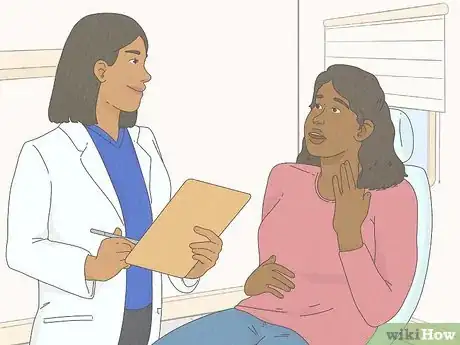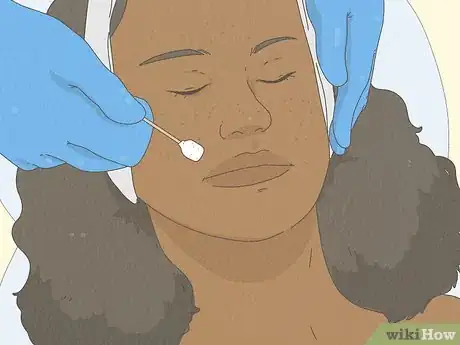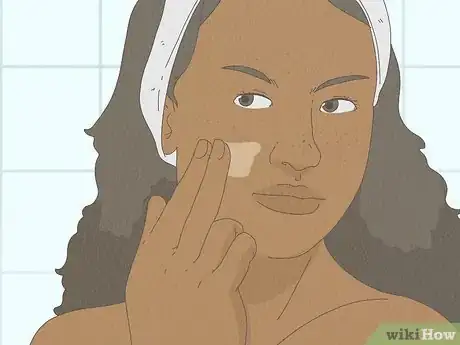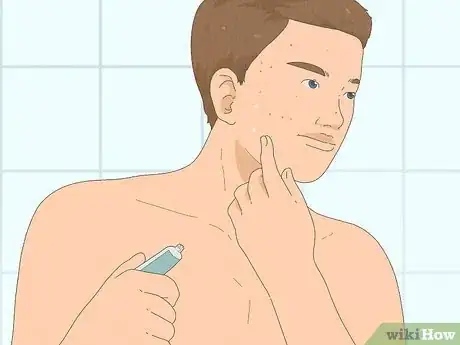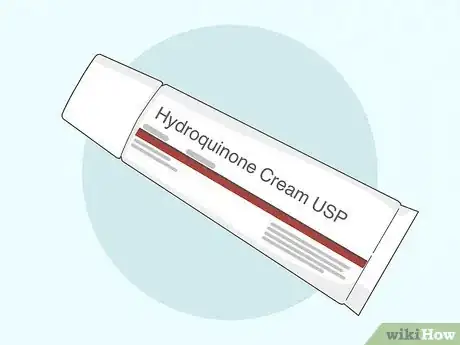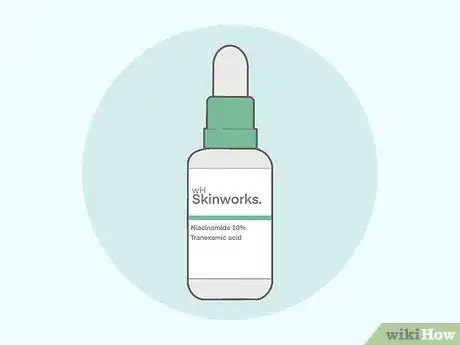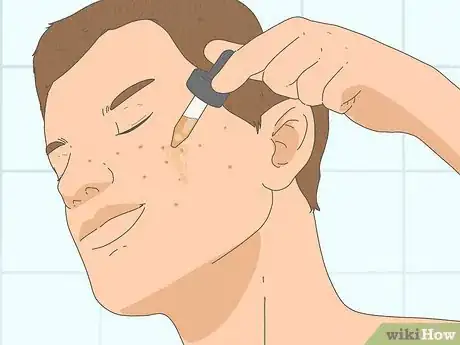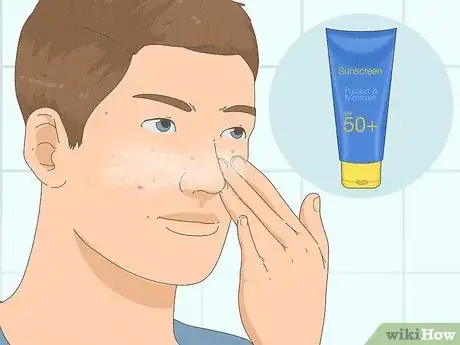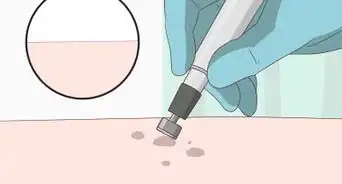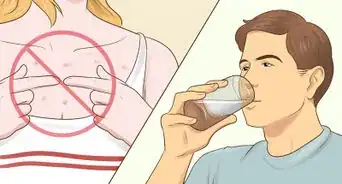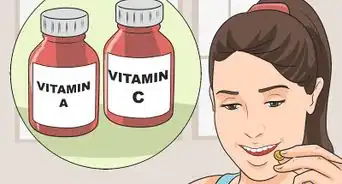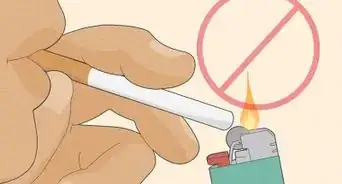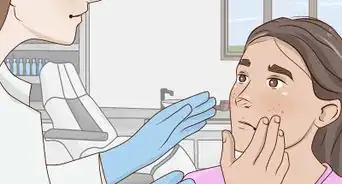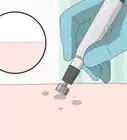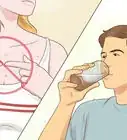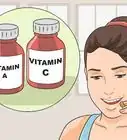This article was co-authored by Aanand Geria, MD. Dr. Aanand Geria is a board certified dermatologist, a clinical instructor at Mt. Sinai, and the owner of Geria Dermatology based in Rutherford, New Jersey. Dr. Geria's work has been featured in Allure, The Zoe Report, NewBeauty, and Fashionista, and he has peer-reviewed work for the Journal of Drugs in Dermatology, Cutis, and Seminars in Cutaneous Medicine and Surgery. He holds a BS from the Penn State University and an MD from Rutgers New Jersey Medical School. Dr. Geria then finished an internship at Lehigh Valley Health Network and a dermatology residency at the Howard University College of Medicine.
There are 10 references cited in this article, which can be found at the bottom of the page.
wikiHow marks an article as reader-approved once it receives enough positive feedback. In this case, 80% of readers who voted found the article helpful, earning it our reader-approved status.
This article has been viewed 244,133 times.
You can end up with dark spots from mild, moderate, or severe acne, although they are relatively uncommon in cases of mild acne. Some over-the-counter products can help lighten dark spots. Generally, though, it's best to see a dermatologist to get a professional treatment.[1] Consider trying some approaches at home, then consult a professional if you can't clear up the condition yourself.
Steps
Getting a Professional Treatment
-
1See a dermatologist. Make an appointment with a dermatologist, which is a doctor who specializes in skin and hair. Let them examine your skin and get a detailed medical history. They might ask about your skincare routine, too.
- Ask your dermatologist about a skin lightening cream like hydroquinone, which is available in OTC-strength (2%) and prescription-strength (4%) formulas.[2]
-
2Get a chemical peel or acid treatment for indented scars. The name for these indentations is atrophic scars. If you've got these, your dermatologist might suggest a chemical peel or a treatment using glycolic acid, pyruvic acid, or salicylic acid. Microdermabrasion, in which your skin is buffed down, and laser treatments also work well for these kinds of scars.[3]
- Fillers are another option for atrophic scars.[4]
Advertisement -
3Try silicone gel or cryotherapy for raised scars. Raised scars are called hypertrophic scars. They respond better to silicone gel, steroid therapy, and cryotherapy (freezing). A pulsed dye laser treatment also works well for hypertrophic scars. See which your dermatologist recommends.[5]
- Injections can also help flatten raised scars.[6]
Treating Dark Spots at Home
-
1
-
2Lighten dark spots with hydroquinone. Head to the pharmacy and pick up a 2% hydroquinone cream. Apply it twice a day by dabbing a little bit on each dark spot.[11]
-
3Use a product that contains niacinamide and tranexamic acid. The combination of these 2 ingredients can help lighten dark spots.[12] Niacinamide is a form of vitamin B3. Look for a cream containing these ingredients and use it according to the instructions.
-
4
-
5Wear sunscreen every day. Put on sunscreen with an SPF of 30 or higher each day.[15] UV rays from the sun or tanning beds can make dark spots worse. Additionally, some dark-spot treatments can make you more sensitive to the sun.
Expert Q&A
Did you know you can get premium answers for this article?
Unlock premium answers by supporting wikiHow
-
QuestionWhat is the best dark spot remover?
 Aanand Geria, MDDr. Aanand Geria is a board certified dermatologist, a clinical instructor at Mt. Sinai, and the owner of Geria Dermatology based in Rutherford, New Jersey. Dr. Geria's work has been featured in Allure, The Zoe Report, NewBeauty, and Fashionista, and he has peer-reviewed work for the Journal of Drugs in Dermatology, Cutis, and Seminars in Cutaneous Medicine and Surgery. He holds a BS from the Penn State University and an MD from Rutgers New Jersey Medical School. Dr. Geria then finished an internship at Lehigh Valley Health Network and a dermatology residency at the Howard University College of Medicine.
Aanand Geria, MDDr. Aanand Geria is a board certified dermatologist, a clinical instructor at Mt. Sinai, and the owner of Geria Dermatology based in Rutherford, New Jersey. Dr. Geria's work has been featured in Allure, The Zoe Report, NewBeauty, and Fashionista, and he has peer-reviewed work for the Journal of Drugs in Dermatology, Cutis, and Seminars in Cutaneous Medicine and Surgery. He holds a BS from the Penn State University and an MD from Rutgers New Jersey Medical School. Dr. Geria then finished an internship at Lehigh Valley Health Network and a dermatology residency at the Howard University College of Medicine.
Board Certified Dermatologist A chemical peel could help. Chemical peels remove the hyperpigmented top layer of your skin. They can be very effective, but they typically require several treatments, and they may leave you sensitive to the sun for a while. It's best to schedule these treatments in the fall and winter, when the sun's rays aren't as strong.
A chemical peel could help. Chemical peels remove the hyperpigmented top layer of your skin. They can be very effective, but they typically require several treatments, and they may leave you sensitive to the sun for a while. It's best to schedule these treatments in the fall and winter, when the sun's rays aren't as strong. -
QuestionHow do I get rid of dark spots due to pimples?
 Aanand Geria, MDDr. Aanand Geria is a board certified dermatologist, a clinical instructor at Mt. Sinai, and the owner of Geria Dermatology based in Rutherford, New Jersey. Dr. Geria's work has been featured in Allure, The Zoe Report, NewBeauty, and Fashionista, and he has peer-reviewed work for the Journal of Drugs in Dermatology, Cutis, and Seminars in Cutaneous Medicine and Surgery. He holds a BS from the Penn State University and an MD from Rutgers New Jersey Medical School. Dr. Geria then finished an internship at Lehigh Valley Health Network and a dermatology residency at the Howard University College of Medicine.
Aanand Geria, MDDr. Aanand Geria is a board certified dermatologist, a clinical instructor at Mt. Sinai, and the owner of Geria Dermatology based in Rutherford, New Jersey. Dr. Geria's work has been featured in Allure, The Zoe Report, NewBeauty, and Fashionista, and he has peer-reviewed work for the Journal of Drugs in Dermatology, Cutis, and Seminars in Cutaneous Medicine and Surgery. He holds a BS from the Penn State University and an MD from Rutgers New Jersey Medical School. Dr. Geria then finished an internship at Lehigh Valley Health Network and a dermatology residency at the Howard University College of Medicine.
Board Certified Dermatologist
Warnings
- Avoid using lemon juice, bleach, or abrasive rubs on your skin. While you might see these and other "home remedies" online, they can actually do more harm than good.[16]⧼thumbs_response⧽
References
- ↑ https://www.aad.org/public/diseases/acne-and-rosacea/acne-scars
- ↑ Aanand Geria, MD. Board Certified Dermatologist. Expert Interview. 8 July 2020.
- ↑ https://www.ncbi.nlm.nih.gov/pmc/articles/PMC2958495/
- ↑ https://www.aad.org/public/diseases/acne/derm-treat/scars/treatment
- ↑ https://www.ncbi.nlm.nih.gov/pmc/articles/PMC2958495/
- ↑ https://www.aad.org/public/diseases/acne/derm-treat/scars/treatment
- ↑ https://www.aad.org/public/diseases/acne/diy/skin-color
- ↑ https://www.aad.org/public/diseases/acne/skin-care/tips
- ↑ https://www.aad.org/public/diseases/acne/diy/skin-color
- ↑ Aanand Geria, MD. Board Certified Dermatologist. Expert Interview. 8 July 2020.
- ↑ https://www.health.harvard.edu/newsletter_article/Topical_drug_treatments_for_age_spots
- ↑ https://onlinelibrary.wiley.com/doi/10.1111/srt.12107
- ↑ https://www.aad.org/public/everyday-care/skin-care-secrets/routine/fade-dark-spots
- ↑ Aanand Geria, MD. Board Certified Dermatologist. Expert Interview. 8 July 2020.
- ↑ https://www.aad.org/public/everyday-care/skin-care-secrets/routine/fade-dark-spots
- ↑ https://www.asds.net/skin-experts/skin-conditions/hyperpigmentation
About This Article
One way to get rid of dark spots from acne at home is by rubbing lemon juice on your skin before you go to bed. Since lemon juice is a natural skin-lightening agent, dab some on your dark spots using a cotton ball and let it dry for about 10 minutes. Instead of rinsing it off, apply a moisturizing oil, like almond or argan, on top of it. Alternatively, crush two 325 mg aspirin tablets and mix them with 2 tablespoons of honey. Then, add just enough water to make a smooth paste and apply it to your dark spots with a cotton swab. After leaving the paste on your skin for 15 to 20 minutes, rinse with warm water and apply a moisturizer. For more tips, like how to get rid of dark spots with the help of a dermatologist, scroll down.
